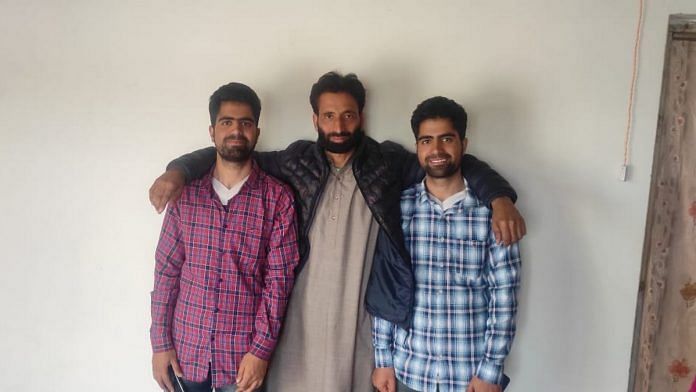
Srinagar: It’s been more than a week since Bashir Ahmed Bhat’s 20-year-old twin sons Gowhar and Shakir cleared the National Eligibility Cum Entrance Test (NEET), but relatives, friends and acquaintances continue to pour in to their home in Batpora, Baramulla district, to congratulate them.
“It is hard to believe it sometimes. Some people who would not come to my home even if I invited them are turning up to congratulate us,” says Bashir Bhat, who runs a fair price shop near his home.
Gowhar scored 657 and Shakir scored 651 to qualify for MBBS, justifying their faith in giving NEET a second shot — in their first attempt last year, the twins had scored 524 and 498 marks respectively and could’ve opted to study dental surgery.
A long and difficult road
The first time around, Gowhar and Shakir had not taken coaching for the competitive exam, but they decided not to leave anything to chance the second time, and enrolled in a coaching centre in Srinagar. They went to stay in a hostel provided by their coaching centre and had paid Rs 6,000.
But this was July 2019. Just three weeks later, a massive clampdown was enforced along with a communications blackout in Jammu and Kashmir when the Narendra Modi government scrapped the special status of the state under Article 370 of the Constitution, and bifurcated it into two union territories — J&K and Ladakh.
The Bhat twins had to return to their village because there were no classes, leaving them with just one option — self-study. “Initially, we thought that this year too we would not be able to qualify. But then we decided that we will try on our own. We would do self-study again and work a bit harder. The worst that could have happened was that we wouldn’t have made it,” Gowhar tells ThePrint.
An important part of the preparations for NEET are mock tests, the twins believe, but with coaching centres and internet services shut, that seemed impossible. “When we were able to take offline tests, we realised we were six months behind students outside Kashmir. They had sat through a couple of test series. But we sat for 40 offline tests to prepare, and luckily, a decent number of questions posed were similar to those that appeared in the tests we had sat for,” Gowhar recounts.
The twins say their father struggled hard in the consecutive lockdowns in Kashmir — first due to the scrapping of Article 370 and then the Covid-19 pandemic — to let them study and strive for a better life. Bashir Bhat regularly had to visit the district magistrate’s office and wait for hours to access the internet, a facility provided by the government during last year’s communication blackout. But the number of people there would often be massive, forcing him to visit Srinagar, where there are more internet centres. He would download the previous years’ question papers, and go to bookshops to buy the necessary study material for his sons.
“I did not want my sons to spend time waiting to download questions papers. It would have wasted their time, so I would travel to Srinagar a couple of times in a week and get whatever they needed. There are people who now suggest that events that happened last year did not affect students. They have no idea about the efforts families had to put in. All families can’t afford the time or resources,” says the senior Bhat.
Aspiration for sons to be doctors
Bashir Bhat says he had dreamt that his sons would become doctors ever since he had taken a job at a medical agency in Srinagar back in 2002.
“I would earn only Rs 2,000 a month at that medical agency. I distributed medicines on a cycle and it was hard work, but it made me realise what I wanted for my sons. I wanted them to be doctors and do good for society. Luckily my sons also wanted to be doctors. They have been fascinated by the profession since childhood. It’s a dream come true,” Bhat adds.
The twins studied at the Islamic Public Model school till class 8, and then at the Mohammadia High school till class 12. They then took admission at a government higher secondary school, and began preparing for NEET.
But the repeated postponements of the exam this year due to the Covid pandemic made them and their family feel anxious and disheartened. Their father says: “There were ups and downs in our mental and emotional states, but though we were struggling ourselves, we kept on motivating them. I earn about Rs 8,000-9,000, and things have been difficult since last year. But I kept on telling them not to worry, just study and leave the rest to Allah.”
All of this finally paid off last Friday when the NEET results were declared. Now, the brothers just want to study hard to be doctors. “We want to work for our people here. If we aren’t here for our people, what is the purpose of becoming a doctor?” says Shakir. Gowhar agrees.
Subscribe to our channels on YouTube & Telegram
Why news media is in crisis & How you can fix it
India needs free, fair, non-hyphenated and questioning journalism even more as it faces multiple crises.
But the news media is in a crisis of its own. There have been brutal layoffs and pay-cuts. The best of journalism is shrinking, yielding to crude prime-time spectacle.
ThePrint has the finest young reporters, columnists and editors working for it. Sustaining journalism of this quality needs smart and thinking people like you to pay for it. Whether you live in India or overseas, you can do it here.